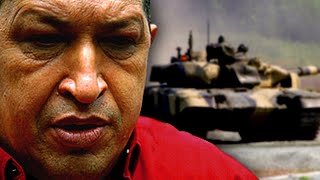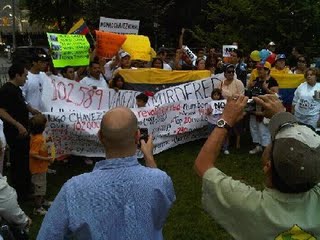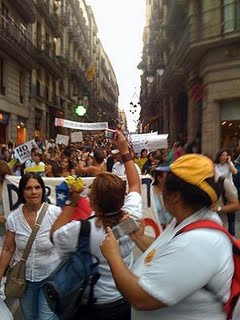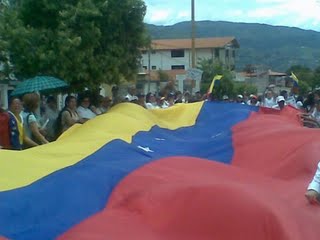Friend in low places
Sep 15th 2009 CARACAS
From Economist.com
Hugo Chávez dreams of forging a new world order
Shutterstock/AFP

THE mountains and jungles of South America are not ideal terrain for tank warfare. So it is hard to envisage what role Venezuela’s president, Hugo Chávez, has in mind for the dozens of Russian tanks on his latest military shopping list. The strategic purpose of a recent tour that took him to some of the world’s least salubrious regimes is, however, easier to discern. And it led America’s State Department to give warning on Monday September 14th of a “serious challenge to stability” in the region.
Venezuela’s increasingly autocratic leader returned on Friday from a trip that took him to Libya, Iran, Algeria, Syria, Turkmenistan, Belarus and Russia, though he also found time for a visit Spain and the Venice film festival. On his jaunt he was decorated by Libya’s leader, Muammar Qaddafi, and embraced by Aleksandr Lukashenko, president of Belarus.
Apart from discussing weapons and oil with the Russians, he also courted condemnation by inviting Sudan’s pariah president, Omar al-Bashir, to Caracas, and breezily announced a nuclear co-operation deal with Mahmoud Ahmadinejad, Iran's president. Since the latter revelation was made to Le Figaro, a French newspaper, it fell to the French foreign ministry to issue a curt reminder of UN Security Council resolution 1737. This explicitly forbids the export by Iran of material from its controversial nuclear programme, which Mr Chávez supports.
The trip did much to bolster Mr Chávez’s well-earned reputation for outrageous statements. But there is method to his madness. The foreign-policy section of Venezuela’s “First Socialist Plan—2007-2013” (dubbed the “Simón Bolívar National Project”) assigns an “integral political alliance” with Iran, Syria, Belarus and Russia the highest priority outside the Latin American and Caribbean region. The rationale for this curious hotchpotch of alliances is the “common anti-imperialist interests” of those five countries—the imperialist in question being America.
Among the scheme’s aims is the strengthening of national defence and sovereignty. Not only the tanks but sophisticated anti-aircraft systems make up the order to Russia. Mr Chávez, a former lieutenant-colonel in Venezuela’s army, says these weapons will make it “very difficult for foreign aircraft to come and bomb us”. Having already spent at least $4.4 billion on Russian weapons, he has now secured an additional $2.2 billion credit-line from that country to lavish on more military hardware. Three submarines are among other possible purchases, press reports say.
In pursuit of his goal to “break North American imperialist hegemony”, the Venezuelan president has deployed to the full his prime asset—the country’s oil reserves. Thus Iran was promised 20,000 barrels of petrol a day, in potential defiance of sanctions advocated by America and despite Venezuela’s current problems supplying its own markets with fuel. Russia’s national oil consortium was also assigned a patch of the Orinoco heavy oil belt.
Closer to home, Mr Chávez’s strategic plans have come a little unstuck. He has so far failed in his quest for admittance to the Mercosur trade block. ALBA, his alliance of like-minded governments, lost a member after a coup in Honduras just over six weeks ago. And he has failed to secure regional condemnation of Colombia’s decision to allow American troops to deploy in seven military bases in the country.
Undaunted, he continues to pursue “greater world leadership”. If attention is what he is seeking, he finally seems to have got it. Last week Robert Morgenthau, a veteran New York district attorney, gave warning that Venezuela’s alliance with Iran was a threat to American interests. Bank accounts in Andorra supposedly belonging to individuals close to Mr Chávez have been frozen, reportedly because of the American Treasury Department’s suspicions of links to terrorism.
Mr Chávez is determined to play in the big leagues. His avowed calculation is that by helping to stir up trouble for America in many places simultaneously, he can bring about the collapse of “the empire”. The regimes he is so assiduously cultivating are, by this account, the nucleus of a new world order. Although this seems far-fetched perhaps the world should start to take him a little more seriously.
Labels: Andorra, Hugo Chavez, Russia, terrorists







 Tenerife - Spain
Tenerife - Spain Barquisimeto - Venezuela
Barquisimeto - Venezuela Merida Venezuela
Merida Venezuela
